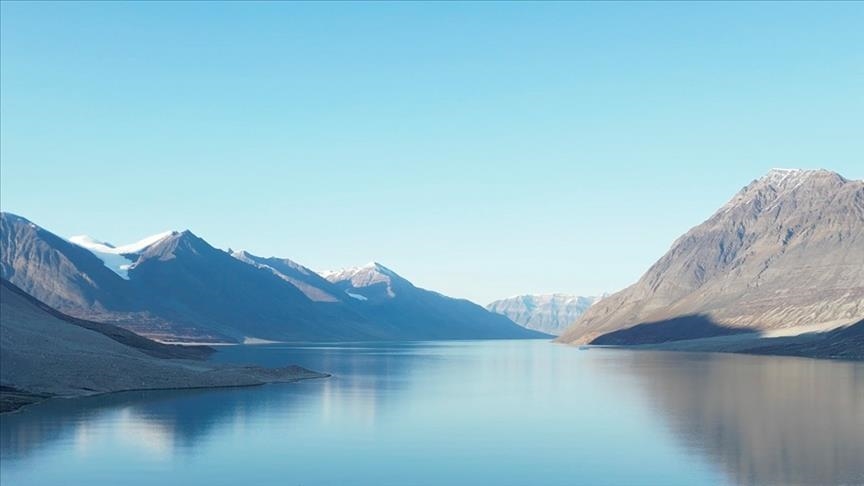Fasting in the Arctic: A Palestinian’s unique Ramadan in Greenland
Due to the varying length of days in Arctic Greenland, Ramadan fasting can stretch to a potential 23 hours a day, says Racan Mansoor, who this year is fasting for 12 hours

- 'It's a bit difficult because you don't have anybody fasting with you ... like everybody just eats in front of you, and they're not used to people fasting,' Mansoor, 24, tells Anadolu
- Greenlanders 'are nice people. They’re also warm and welcoming, as long as you respect their country,' Mansoor says
NUUK, Greenland
Gazing from his window at the dimly lit hills and frigid sea, 24-year-old Racan Mansoor patiently waits to take his first bite in 12 hours.
This is Mansoor's second year in Greenland, where he, like millions of others worldwide, is observing Ramadan, the holy month in the Muslim lunar calendar.
For him, fasting itself is nothing unusual; it is, after all, what Muslims do during this sacred time of year. What is unusual is where he is fasting — and the fact that he is one of very few Muslims living there.
He lives in Nuuk, the capital of Greenland, which is also the northernmost capital in the world. The length of the day, and therefore fasting, can be demanding due to the city's geographical characteristics.
Nuuk sits just south of the Arctic Circle. In the summer months, daylight can stretch to a staggering 23 hours a day. For a Muslim, this would mean fasting 23 hours and having only one hour to eat.
Mansoor, having prepared traditional Palestinian food, waits for sunset — the time to break his fast.
He said he has been living in Greenland’s capital for just over a year.
“It’s very beautiful, it’s very safe, and it’s nice, quiet,” he said.
This year, the fasting period is 12 hours, but Mansoor has heard that in summer months it can reach up to 23 hours. As the Muslim lunar calendar is shorter than the Gregorian calendar, Ramadan moves back by about 11 days each year, meaning the length of the fast shifts depending on sunrise and sunset.
“It's a bit difficult because you don't have anybody fasting with you ... like everybody just eats in front of you, and they're not used to people fasting,” Mansoor explained.
He added: “Always, my friends ask me, ‘Do you want to drink something?’ ‘Do you want to eat something?’ And now, I have been here one year. I had Ramadan last year and my friends, now they know how it works.
“So, it's been easier. Last year it was 16 hours. This year it’s 12 hours, almost. I heard it was 23 hours. I don't know. I haven't tried yet. I read it online.”
Mansoor also said he feels somewhat out of place fasting without any other Muslims around him.
“It's actually weird, because I was born and raised in Denmark, I've been in a lot of Muslim countries, so I'm usually used to people being Muslims around me, and now there's non-Muslims around me, you know what I mean,” he said.
Respect
Mansoor said that when he first arrived in Greenland, some people would shout “Allahu Akbar” at him in an attempt to mock him.
“I told them it's disrespectful. So, people stopped doing that.”
Mansoor also noted that as long as one respects the local Inuit culture, the people are hospitable and friendly.
“They are nice people. They’re also warm and welcoming, as long as you respect their country.”
He added: “I've seen a lot of people that come from Denmark, and when they come here, they act like it's their country. They can do what they want and stuff like that. And it doesn't work like that. You know, if you respect the country, they respect you. They open their arms for you, and they welcome you.”
Born and raised in Denmark
Mansoor, who was born and raised in Denmark by Palestinian parents, said his father always raised him with strong Palestinian and Muslim values, and he continues to uphold those values.
He mentioned that his father has joined him in Nuuk over the past few years, and together they are working to set up a cryptocurrency and currency exchange business.
The young Palestinian said that he and his father often spend time watching Dirilis: Ertugrul (Resurrection: Ertugrul) — a Turkish historical fiction drama produced by public broadcaster TRT and popular across many countries.
Mansoor ends his fast with traditional Palestinian food prepared by his father and sends a message of blessings to the Muslim world: “Ramadan Kareem.”
Anadolu Agency website contains only a portion of the news stories offered to subscribers in the AA News Broadcasting System (HAS), and in summarized form. Please contact us for subscription options.







